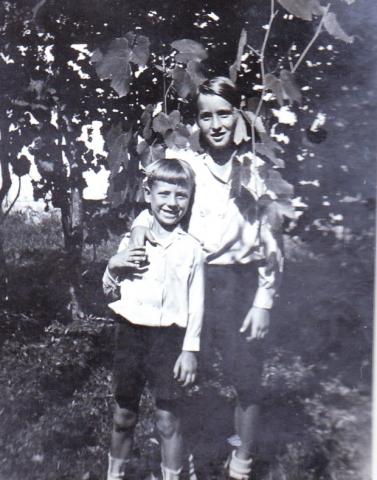Leopold Wenger's Childhood
- 3089 reads
Childhood
By Willy Wenger
copyright 2013 Wilhelm Wenger and Carolyn Yeager
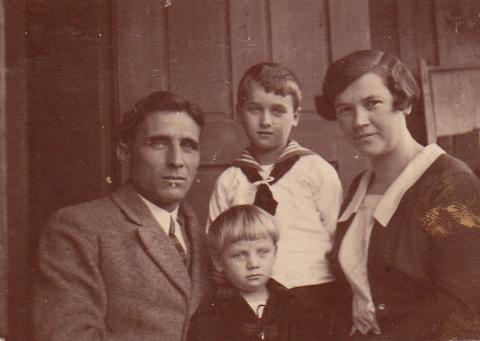
The young Wenger family in 1928 - Bibi is 6, Willy 2
Our father Leopold Wenger was born 1893 in Bad Gleichenberg, Styria, Austria. Our mother Grete was born in 1896 in Marburg, Styria and became a teacher in the primary school in Bad Gleichenberg.
When 14 years old, my father (pictured right) entered into the 4-year technical high school of the Austrian Imperatorial and Royal Navy (Maschinenschule der österr. k+k Kriegsmarine) from where he obtained the license of a leading engineer. The school was located at the Navy's first harbour in Pola (today Pula, Croatia). He took part in the great naval parade in Plymouth during the coronation of George V in June 1911, on board the Austrian battleship “Radetzky.” At that period the Austrian navy was 5th or 6th in the world. More than 200 ships had been anchored in front of the South Coast near Spithead. All maritime nations had been invited to send warships to represent themselves, and it was the most gigantic show of the fleet ever seen.
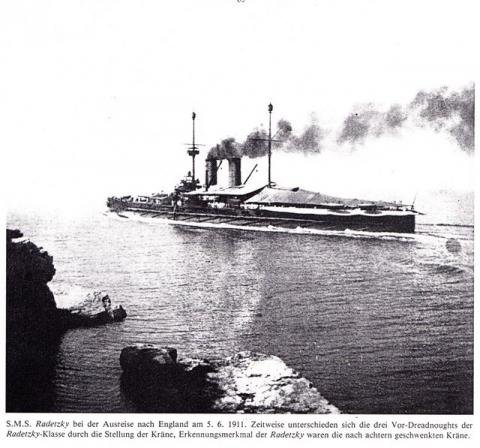
Above: The Austrian battleship S.M.S. Radetzky arrives to England on May 6, 1911, with Leopold Sr. as part of the crew.
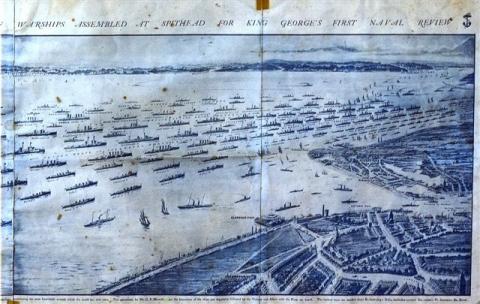
Above: Warships assembled at Spithead for King George's first naval review.
My father was very unhappy when, after WWI, Austria lost its access to the sea. For him the sea had become his homeland. He thus named his small house in Bad Gleichenberg Seemannslos, “the refuge of a sailor,” situated in South-eastern Styria, not far from the Hungarian border to the east and the Slovenian border in the South. The countryside is agreeably hilly, topped by churches, Chateaux, castles—giving an idyllic and romantic look.
At right: The castle of Riegersburg - one of the most beautiful in Europe.
Agriculture is the main industry, with many apple orchards, vineyards in the southern part, corn all over, hot radish, and well known for its pumpkin seeds.
"Seemannslos" in Bad Gleichenburg as it is today, now Willy's home.
Leopold Jr. was born on 19 November 1921 in Graz, the capital of Styria, two years after the humiliating Treaty of St Germaine, which came to us as the result of the First World War. The great Austrian Empire was dismembered due to the hatred of the “Big Three,” President Wilson (USA), Lloyd George (UK) and Clemenceau (France). What remained was a small country which, even though it could call itself a German-Austrian Republic, could not join the German Reich. The result was chaos. The new government was aware that they could not govern independently due to the lack of experience—up to then the Habsburgs had ruled in the land. The politicians quarreled among themselves so much that eventually most people wished to join Germany.
Little Leopold's nickname “Bibi” came about because he could not pronounce the word “Bubi,” (Bub is a young boy in German). Bibi grew up in the town of Anger in Eastern Styria. He loved winters. Skiing in the hilly region was then a rarity, but for Christmas Bibi got a couple of small-size skis and was a sensation. His schoolmates managed to try this new sport by taking staves out of old wine barrels they got from the barrel maker and fixing the staves onto their shoes. They cut long sticks from the hazelnut bushes to help them keep balance and control direction, and off they went.
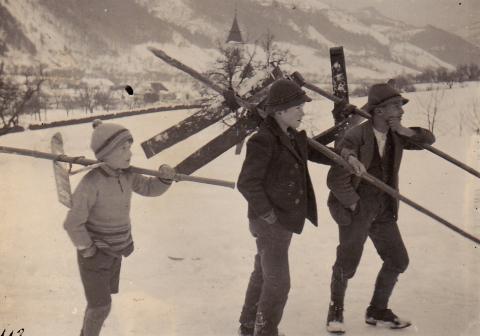
Bibi with older schoolmates in Anger. Staves from old wine barrels served as skis for them.
On 6 May 1926 Bibi got a little brother, Willy. In 1929 our parents moved to Leoben in Upper Styria, where our father became a manager of a roofing and sheet-metal company. Bibi finished elementary school and entered the Gymnasium. Willy went to kindergarten in the same building.
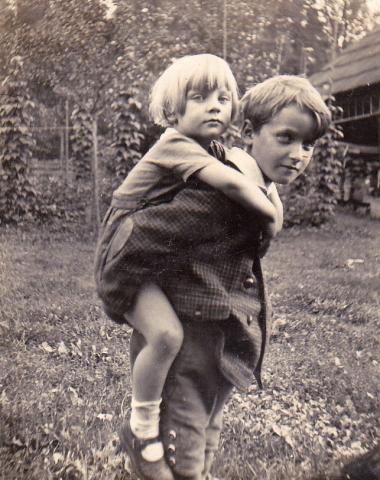
"He ain't heavy - he's my brother."
At that time, Austria was still in a troubled and rotten shape. The unemployment rate was particularly high. On top of that, there were almost always demonstrations somewhere because of the great number of political parties. There were the Socialists, the Christian Democrats, the Schutzbund, the National Socialists, the Fatherland Front (founded by Dollfuss), Christian Social, and the Communists—all fighting each other. But almost all the parties were in agreement as to a union with Germany. In Tyrol and Styria there were referendums and everywhere the majority voted for a union with Germany.
In Leoben, there were many popular entertainment events, and especially sports and social ones. The German Sports Association, well organized and popular, stood behind many of the events. There was a big field in Leoben and all the sports enthusiasts met there. In the “valley” at a nearby mountain range, people of all ages participated in physical exercises and gymnastics.
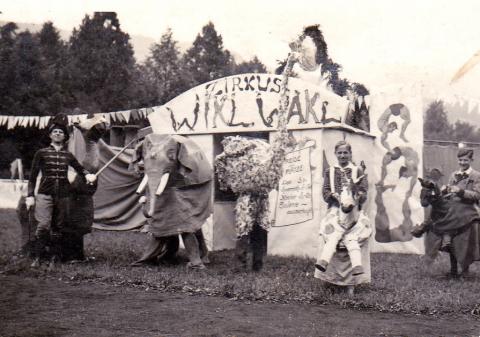
Circus Wickl-Wackl with Dad's animal models - the entertainment was necessarily of the home-grown variety.
In the summer, there was a sports festival with various demonstrations of athletes, and our own "Zirkus Wickl-Wackl” was a great amusement. Everything was prepared by us. As our father was a pretty clever model maker, he created a number of papier mâché circus animals and painted them in bright colors. In the summer, the Sports Association organized the rallies of gymnasts. In the winter, the gymnasts showed off their skills in the great hall of the Hotel Post. Of course, there were competitions in skiing and these were extremely popular. And during the carnival there were always masked balls for young and old. 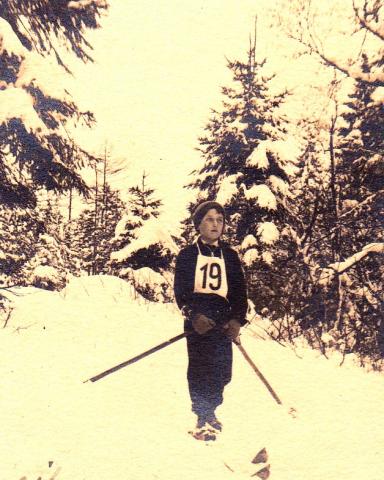
Bibi takes third place in the Leoben Downhill Race
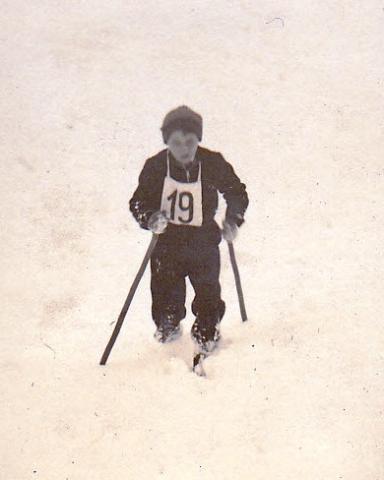
Bibi - a determined competitor
We were members of the German Gymnastics Association. At the first ski race, Bibi scored 3rd place. When the Olympic Games of 1936 took place in Berlin, we wanted to emulate all the athletes. We listened enthusiastically to the radio and looked longingly to Germany which, after Hitler came to power, went through a great change, leaving us sad for ourselves, and jealous.
My Aunt Hilda was a spectator at the Olympics in Berlin and we listened with great interest to her description of all the innovations which she had seen. The new government under Adolf Hitler had done incredible things since 1933. Berlin presented itself as a very clean city. Many old houses were renovated, testifying to the reconstruction in all the German Reich. Unemployment disappeared. It was hard to take in how much the new regime had done in the short time of less than three years, and after such a difficult time.
That was the moment, perhaps the motivation, for my brother Bibi to join the illegal Hitler Youth. Also our father joined the NSDAP, although this party was banned in Austria. They had not said anything to me about it because they considered me too young.
Once a Zeppelin came floating over Leoben. We had excitedly followed its air travel through Austria and burst into joy when we saw this technical wonder hovering above us. On another occasion, a huge bus from Germany arrived in the main square. Inside was an exhibition about the German regions. There were many pictures showing people's lives, their houses, what they had achieved in the recent times. One could take very large brochures for free. We were speechless. You could see workers who were able go on vacations with their families through the KdF (Strength through Joy) program—trips on cruise ships like the "Wilhelm Gustloff" to the Canary Islands. We liked it very much and looked with envy to our neighboring country.
Below, Bibi and Willy at the house in Bad Gleichenberg in 1932 - always best friends.
